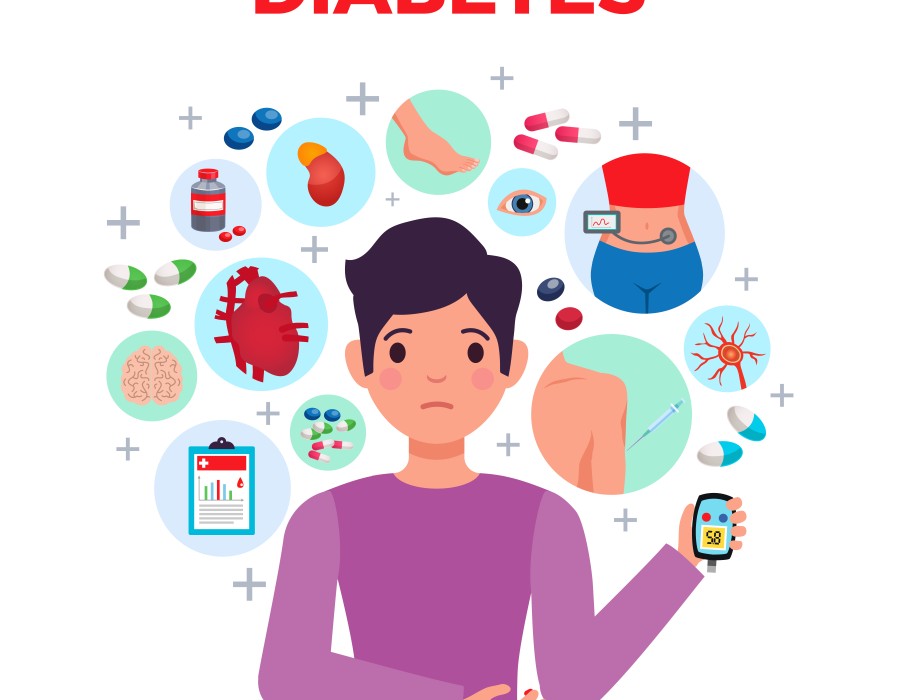Diabetes is a complex condition that impacts more than just blood sugar levels. One area that often goes overlooked is its effect on digestive health. Liver Health and Digestion: The Key Connection highlights how interconnected these systems are, particularly for those living with diabetes. People with diabetes, especially those with long-standing or poorly controlled cases, may experience various digestive issues. These issues might range from mild discomfort to severe gastrointestinal disorders. Understanding the link between diabetes and gut health is essential for overall well-being.
In this post, we'll look at the relationship between diabetes and digestive health, the most frequent digestive disorders that diabetics confront, and important factors for properly managing both conditions. Consulting a gastroenterologist in Surat can provide valuable insights into managing these complications effectively and maintaining good digestive health.
How Diabetes Affects Digestive Health
- Nerve Damage (Diabetic Neuropathy): Diabetes can harm the vagus nerve, which regulates digestion, slowing the passage of food through the digestive tract.
- Gastroparesis: A common complication where the stomach takes longer to empty, causing nausea, bloating, and heartburn.
- Constipation: Nerve damage can slow digestion, leading to chronic constipation.
- Diarrhea: In some cases, nerve damage can cause diarrhea or incontinence.
- Acid Reflux (GERD): Diabetes increases the risk of acid reflux, leading to heartburn and discomfort.
Key Considerations for Managing Digestive Health in Diabetes
- Monitor Blood Sugar Levels:
- Consistently high blood sugar can worsen digestive issues like gastroparesis and constipation.
- Regular blood sugar monitoring, a healthy diet, and taking prescribed medications all help to keep blood sugar steady.
- Incorporate Fiber into Your Diet.
- Fiber promotes digestion and regulates bowel motions, lowering the risk of constipation.
- Vegetables, fruits, whole grains, and legumes are high in fiber, which helps manage blood sugar levels by decreasing carbohydrate absorption.
- Stay Hydrated:
- Drinking plenty of water aids digestion and helps prevent constipation, a common issue in diabetics.
- Water also encourages fiber consumption, making it more efficient in ensuring good digestion.
- Control Portion Sizes:
- Smaller, more frequent meals prevent overwhelming the digestive system and help manage blood sugar spikes.
- Reduces the risk of gastroparesis and acid reflux.
- Pay Attention to Gut Health:
- Maintaining a healthy gut microbiome is crucial for both digestion and insulin sensitivity.
- To maintain a healthy gut flora balance, consume probiotics (e.g., yogurt, kefir, sauerkraut) and prebiotics (e.g., garlic, onions, bananas).
- Exercise Regularly:
- Physical activity stimulates digestion, helps prevent constipation, and improves blood sugar control.
- Aim for at least 30 minutes of moderate exercise, such as walking, cycling, or swimming, most days.
- Work with Your Healthcare Team:
- Regular check-ups with specialists like endocrinologists, gastroenterologists, or dietitians help manage diabetes and digestive complications.
- Early detection of digestive issues can lead to better treatment and management options.
Common Digestive Issues in People with Diabetes
- Gastroparesis:
- Caused by nerve damage in the stomach, leading to delayed gastric emptying.
- Symptoms: nausea, bloating, vomiting, and early satiety.
- Management: smaller meals, avoiding high-fat and high-fiber foods, and medications.
- Constipation:
- Slow digestion due to nerve damage.
- Management: increase fiber intake, stay hydrated, and exercise regularly.
- Diarrhea:
- Nerve damage may cause diarrhea in some individuals with diabetes.
- Management: blood sugar control, consult a healthcare provider for treatment options.
- GERD (Gastroesophageal Reflux Disease):
- Higher risk of acid reflux in diabetics, leading to heartburn and discomfort.
- Management: smaller meals, avoiding trigger foods, and elevating the head during sleep.
Managing Digestive Health with Diabetes
- Symptom Monitoring: Track any digestive issues and discuss them with healthcare providers for appropriate treatment and management.
- Balanced Diet: Focus on a diet rich in fiber, probiotics, and nutrient-dense foods to support digestion and blood sugar control.
- Lifestyle Adjustments: Regular physical activity, proper hydration, and stress management help maintain both digestive and blood sugar health.
Conclusion
Digestive health is an essential part of managing diabetes. By paying attention to your digestive symptoms and following a comprehensive care plan, you can improve both your gut health and overall well-being. Keep in mind the key considerations we've discussed, such as blood sugar management, dietary changes, hydration, and exercise. With the right approach, you can better navigate the connection between diabetes and digestive health for a healthier, happier life.





Comments